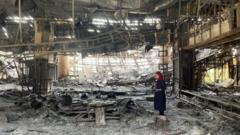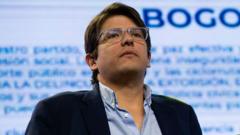With Pope Francis hospitalized due to pneumonia and facing a respiratory crisis, concerns grow over the absence of a public response protocol for end-of-life decisions amid uncertainty about his own wishes.
Health Crisis of Pope Francis Raises Questions on End-of-Life Decisions

Health Crisis of Pope Francis Raises Questions on End-of-Life Decisions
The recent respiratory crisis faced by Pope Francis has ignited discussions regarding the future of the papacy and the potential implications for his end-of-life choices.
Article text:
In light of Pope Francis's recent hospitalization for pneumonia, many are looking closely at the potential implications for succession and healthcare decisions facing the Roman Catholic Church. The 88-year-old pontiff’s health crisis occurred during a two-week stay at the hospital, prompting urgent calls for clarity on his end-of-life plans. This ordeal has raised several questions: What procedures are in place if the pope is incapacitated for a prolonged period? What preferences does Francis have for medical interventions, especially as his health continues to fluctuate?
Although the Vatican has stated that the pope's clinical condition is "stable" following a recent respiratory episode, the uncertainty surrounding his long-term health has many inside the church concerned. Francis previously mentioned having prepared a resignation letter in case of incapacitation, although its specifics remain confidential. Additionally, there has been no public indication of whether he has established a living will or designated someone to advocate for his healthcare preferences should the need arise.
Some supporters and churchgoers believe inquiries into the pope’s wishes regarding end-of-life care are both premature and disrespectful. Conversely, church scholars argue that the absence of a documented protocol for these decisions is a significant concern, especially in light of recent health setbacks. As the situation evolves, many within the Catholic community continue to pray for the Holy Father while grappling with the implications of his potential incapacitation for the leadership of the church.
In light of Pope Francis's recent hospitalization for pneumonia, many are looking closely at the potential implications for succession and healthcare decisions facing the Roman Catholic Church. The 88-year-old pontiff’s health crisis occurred during a two-week stay at the hospital, prompting urgent calls for clarity on his end-of-life plans. This ordeal has raised several questions: What procedures are in place if the pope is incapacitated for a prolonged period? What preferences does Francis have for medical interventions, especially as his health continues to fluctuate?
Although the Vatican has stated that the pope's clinical condition is "stable" following a recent respiratory episode, the uncertainty surrounding his long-term health has many inside the church concerned. Francis previously mentioned having prepared a resignation letter in case of incapacitation, although its specifics remain confidential. Additionally, there has been no public indication of whether he has established a living will or designated someone to advocate for his healthcare preferences should the need arise.
Some supporters and churchgoers believe inquiries into the pope’s wishes regarding end-of-life care are both premature and disrespectful. Conversely, church scholars argue that the absence of a documented protocol for these decisions is a significant concern, especially in light of recent health setbacks. As the situation evolves, many within the Catholic community continue to pray for the Holy Father while grappling with the implications of his potential incapacitation for the leadership of the church.




















